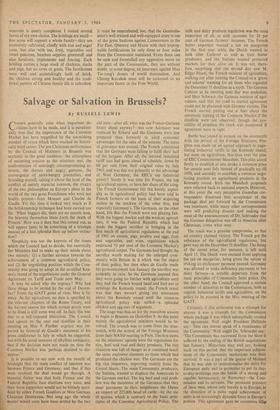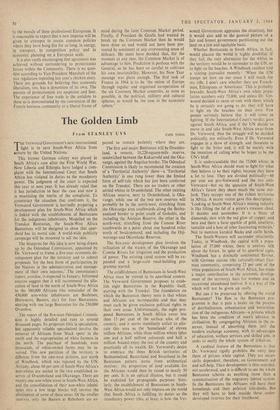Salvage or Salvation in Brussels?
By RUSSELL LEWIS
RISES generally arise when important de-
cisions have to be made, and it is paradoxi- cally true that the importance of the Common Market has been magnified by the astonishing number of crises which have marked its histori- cally brief career. The pre-Christmas performance by the Council of Ministers in Brussels was certainly in the great tradition—the atmosphere of mounting tension as the ministers met, the confrontation of seemingly uncompromising in- terests, the threats and angry gestures, the convergence of news-hungry journalists, and brooding overall, raising it above the level of the conflict of merely material interests, the rivalry of the two philosophies on Europe's place in the world of the two great Frenchmen who were not bodily present—Jean Monnet and Charles de Gaulle. Yet this time it looked very much as if the brinkmanship technique had been carried too far. 'When beggars die, there are no comets seen, the heavens themselves blaze forth the death of Princes.' How was it then that'this turned out, as will appear later, to be something of a triumph instead of a last splendid flare up before extinc- tion?
Simplicity was not the keynote of the issues which the Council had to decide, but essentially the Ministers had to make up their minds about two matters: (1) a further advance towards the achievement of a common agricultural policy, and (2) the negotiating position which the Com- munity was going to adopt in the so-called Ken- nedy round of the negotiations under the General Agreement on Tariff and Trade next May.
It may be asked why the urgency? Why had these things to be settled by the end of Decem- ber? From the GATT point of view, May is far away. As for agriculture, no date is specified by the relevant chapters of the Rome Treaty, and the harvest season for which certain prices were to be fixed is still some way off. In fact, this was due to a self-imposed limitation. The Council had agreed on the year end deadline in their meeting on May 9. Further urgency was im- parted by General de Gaulle's statement at his press conference in July in which he suggested, but with his usual measure of sibylline ambiguity, that if the decision were not made on time the Common Market was 'perhaps destined to dis- appear.'
It is possible to see now with the benefit of hindsight that the main conflict of interests was between France and Germany, and that if this were resolved the deal would go through. A material factor was that both France and the Federal Republic face elections very soon, and their farm supporters would not be blithely sacri- ficed by either French Gaullists or West German Christian Democrats. Not long ago the whole matter would soon have been settled by the two old men—after all, what was the Franco-German treaty about anyway?—but now Adenauer was replaced by Erhard and the Germans were less prepared than formerly to yield economic advantages for the sake of the entente. The sense of grievance was mutual. The French considered that the Germans were failing to fulfil their half of the bargain. After all, the internal industrial tariff cuts had gone ahead of schedule, down by 60 per cent from their original value by July 1963, and was this not primarily to the advantage of West Germany, the EEC's top industrial power? Surely it was time for France, the top agricultural nation, to have her share of the icing. The French Government felt this keenly, especi- ally as its agricultural policy had been sold to French farmers on the basis of their acquiring outlets in the markets of the other five, and especially Germany's. The Germans, on the other hand, felt that the French were not playing fair. With the biggest market and the weakest agricul- ture, it was the Federal Republic which had made the biggest sacrifice in bringing in the first batch of agricultural regulations at the end of 1961 on cereals, pigs, poultry and eggs, fruit and vegetables, and wine, regulations which embraced 53 per cent of the Common Market's agricultural output. The Germans had thought the sacrifice worth making for the enlarged com- munity with Britain in it which was the object of their policy, but then when de Gaulle made his pronouncement last January the sacrifice was evidently in vain. So the Germans insisted that they were going no further with agriculture until they had the French bound hand and foot not to sabotage the Kennedy round; the French retort was that they weren't giving any assurances about the Kennedy round until the common agricultural policy was settled—a splendid chicken and egg sort of argument.
The stage was thus set for the marathon session to begin in Brussels on December 9. At this point mainly the agricultural ministers would be in- volved. The crunch was to come from the nine- teenth, with the arrival of the Foreign Ministers from their NATO meeting in Paris. The first items on the ministers' agenda were the regulations for rice, beef and veal and dairy products. The rice situation was full of danger as it contained much the same explosive elements as those which had produced the chicken war. The Germans are the big rice importers, importing mainly from the United States. The main Community producers, the Italians, wanted to displace the Americans in the German market. The big beef and veal prob- lem was the insistence of the Germans that they must guarantee to their neighbours the Danes an import of 225,000 head' of cattle—by the use of quotas, which is contrary to the basic prin- ciples of the Common Agricultural Policy. The
milk and dairy products regulation was the most important of all, as milk accounts for 28 per cent of German farmers' incomes. The French butter exporters wanted a tax on margarine in the first year while the Dutch wanted to
look after Unilever as well as their butter producers, and the Italians wanted protected markets for their olive oil. It was not, there- fore, surprising that the second day saw M. Edgar Pisani, the French minister of agriculture, walking out after treating the Council to a 'grave and solemn' warning for all those who regarded the December 31 deadline as a myth. The German Cabinet at its meeting next day was unshaken, and Herr Schwarz, the German minister of agri- culture, said that the road to market agreement could not be plastered with German victims. The French started putting out a hint about the automatic lapsing of the Common Market if the deadline were not observed, though the pos- sibility of stopping the clock was mentioned if agreement were in sight, Battle was joined in earnest on the nineteenth with the arrival of the Foreign Ministers. Pro- gress was made on an agreed approach to nego- tiating industrial tariffs in the Kennedy round, but none on agriculture, this time over the plan of EEC Commissioner Mansholt. This plan aimed firstly to establish at one stroke a common price for cereals next July instead of gradually up till 1970, and secondly to establish a common nego- tiating position on agricultural products in the Kennedy round. Both the Mansholt proposals were referred back to national experts. However, at this point the very perceptive Guardian cor- respondent discerned that acceptance of the package deal put forward by the Commission was imminent, while many other correspondents were still predicting disaster and making the most of the announcement of Dr. Schroeder that the German delegation was off to America after Christmas, come what may.
The result was a genuine compromise, so that no country claimed victory. The French got the substance of the agricultural regulations, but gave way on the December 31 deadline. The fixing of the cereal price, for instance, is left until April 15. The Dutch were excused from applying the tax on margarine, being given the option of making an exchequer payment instead. Germany was allowed to make deficiency payments to her dairy farmers—a notable departure from the basic prindiples of Community farm policy. On the other hand, the Council approved a certain number of directives to the Commission, both as regards industrial tariffs and agriculture, on the policy to be pursued in the May meeting of the GATT.
Certainly if this settlement was a triumph for anyone it was a triumph for the Commission whose package it was which substantially created the agreement. Well might President Hallstein say: 'One can almost speak of a renaissance of the Community.' Well might Dr. Schroeder say: `The Community has recovered from the blow it suffered by the ending of the British negotiations last January.' Historians may well say, looking back on this period, that the important achieve- ment of the Community institutions was their survival. It was a part of the genius of Monnet that he was able to institutionalise the drive for European unity and in particular to put its day- to-day.workings into the hands of a strong and capable bureaucracy, or Eurocracy—the Corn- mission and its servants. The persistent pressure of these men, whose only loyalty is to Europe, in the direction of a more rapid achievement of unity is an increasingly dynamic force in Europe's politics. This agreement gave an enormous fillip
to the morale of these professional Europeans. It is reasonable to expect that a new impetus will be given to attempts to create common policies where they have hung fire for so long, in energy, in transport, in competition policy and in economic planning on a European scale, It is also vastly encouraging that agreement was achieved without surrendering to protectionist forces within the Community. There is no ques- tion according to Vice-President Mansholt of the rice regulation repeating last year's chicken story. There are grounds for believing that economic liberalism, too, has a dynamism of its own. The parents of protectionism are suspicion and fear. The experience of free trade is the antidote to these as is demonstrated by the conversion of the French business community to a liberal frame of mind during the later Common Market period. Finally, if President de Gaulle had wanted to break up the Common Market then he would have done so and would not have been pre- vented by sentiment or any overweening sense of delicacy. He must have decided that, for the moment at any rate, the Common Market is of advantage to him. Prediction is perilous with the General, as he has been so careful to cultivate his own inscrutability. However, his New Year message was plain enough. The first task of France in 1964 is to be 'the union of Europe through regular and organised co-operation of the six Common Market countries, as soon as possible, in the political, military and cultural spheres, as would be the case in the economic sphere.'































 Previous page
Previous page